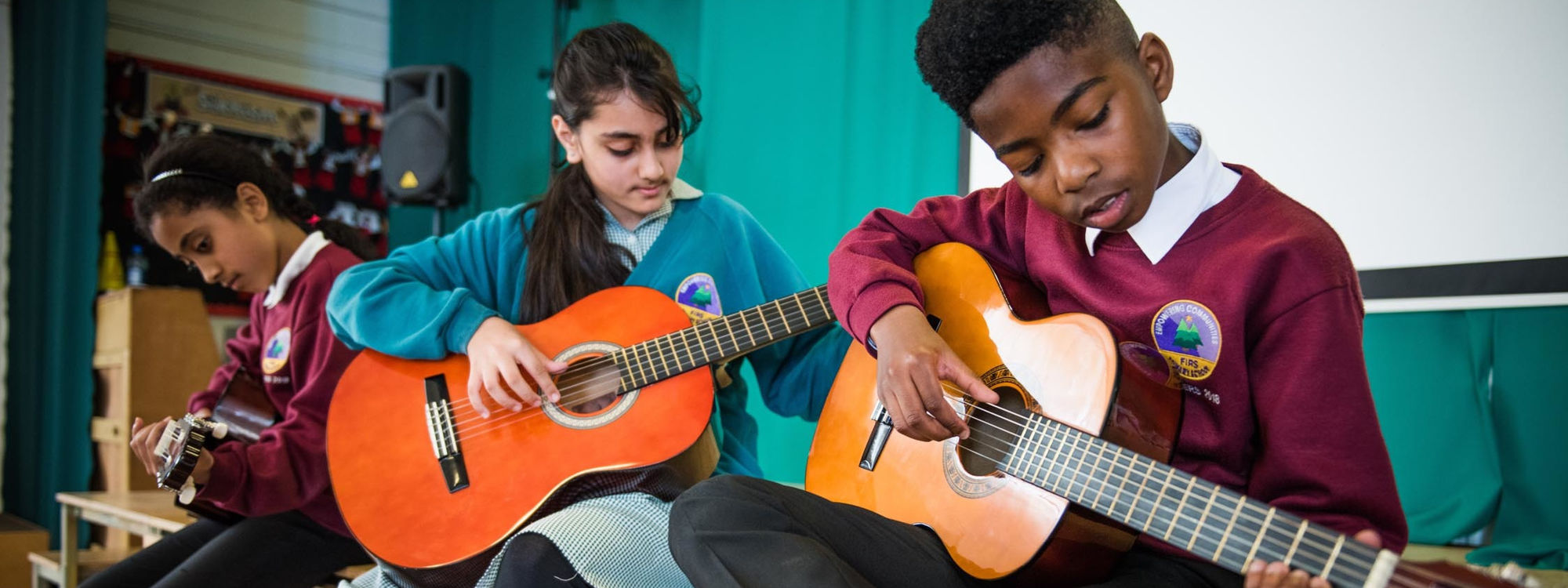- Home
- Curriculum
- Subject Information
- Music
Music
"Every child is a unique instrument—let’s make the world sing with your special sound!"
Intent
At Firs Primary School, our music curriculum empowers pupils to push the boundaries of creativity, nurturing curiosity and encouraging them to delve deeper into their own ideas. Based on the Charanga music scheme, the curriculum offers a rich variety of projects designed to broaden pupils’ musical horizons and understanding.
Pupils will build on their skills and knowledge through performing, listening, analysing, and assessing music from a vast array of historical eras, genres, styles, and traditions. They will gain insight into different artists and musical influences from around the world. Additionally, pupils will develop their singing abilities, use their voices to express themselves, and engage in composing music both individually and collaboratively. Opportunities to learn musical instruments and effectively use technology will help them reach their full potential. They will also engage in creating and producing music, refining their ideas, and documenting their experiences, becoming adept in the subject through the exploration of key musical elements such as pitch, duration, dynamics, tempo, timbre, texture, structure, and appropriate notation systems.
Implementation
Our Music curriculum is structured to provide pupils with a broad foundation of knowledge and a wealth of skills, enabling them to become leaders in the subject, both inspired and inspiring to others. We believe that music is for everyone, fostering inclusivity and creativity in all.
EYFS
To cultivate artistic and cultural awareness, pupils' imagination and creativity will flourish. They will have frequent opportunities to engage with the arts, which is essential for their understanding of the world around them. Pupils will strive to meet their Early Learning Goals by beginning to understand and explore music and musical instruments. They will listen attentively and respond to what they hear, sharing their opinions on various pieces of music and the composers or artists behind them.
Pupils will investigate a range of instruments, which will aid in the development of their fine motor skills and enhance their sensory awareness, allowing music to serve as a means for them to express their individuality. Additionally, they can achieve this by listening to and reacting to music, playing instruments, creating their own instruments, producing sounds, and using their voices.
KS1
In KS1, pupils will be inspired to utilize their voices expressively and inventively through singing songs, reciting chants, and performing rhymes. They will also engage with both tuned and untuned instruments, playing them musically while listening attentively to an array of high-quality live and recorded music. To advance their skills, pupils will investigate, create, choose, and merge sounds, discovering the many connections that exist within the world of music
KS2
In KS2, children are motivated to reach their full potential and prepare for the future, aligned with the vision of the KS3 curriculum following their journey at Firs Primary School. Pupils will be guided to sing and play with increasing confidence and precision. They will gain insights into musical composition, learning to organise and manipulate ideas within musical frameworks while reproducing sounds from memory.
Moreover, pupils will engage in solo and ensemble performances, using their voices and instruments with enhanced accuracy, fluency, control, and expression. They will also be encouraged to improvise and compose music for various purposes, utilizing the interrelated dimensions of music. Pupils will listen attentively, recalling sounds with greater aural memory, and will learn to read and understand staff and other musical notations.
Additionally, they will develop an appreciation for a diverse array of high-quality live and recorded music, exploring different traditions and works by renowned composers and musicians, while also gaining insight into the history of music.
Impact
The impact of the music curriculum will be assessed by evaluating the progress pupils make during their performances, including whole school events, class assemblies, choir sessions, solo singing opportunities, instrumental practices, and other performances in which the children participate. Additionally, pupils’ progress will be measured against the national curriculum objectives and their ability to articulate their learning experiences.
Moreover, pupils will have the chance to build on their prior knowledge and skills through performance, demonstrating their enthusiasm for music by engaging with external organisations, attending venues like the Symphony Hall and the National Exhibition Centre, and participating in various projects that expose them to real-life musicians. Most importantly, this involvement allows pupils to showcase their school to parents, the local community, and a broader audience.
Article 31 of the United Nations Convention on the Rights of the Child emphasizes the child's right to play, rest, and engage in cultural and artistic activities. This article recognizes that play is essential for children's development, allowing them to express themselves, learn social skills, and explore their creativity. It ensures that children have the opportunity to participate in recreational activities and enjoy their childhood free from undue pressures.
At Firs Primary School, we fully embrace and promote the principles of Article 31 by providing a vibrant and supportive environment where children can engage in various artistic and cultural pursuits. Our curriculum is designed to incorporate regular opportunities for creative play, artistic expression, and cultural exploration, encouraging pupils to participate in music, drama, and visual arts. Through initiatives such as school performances, art projects, and collaborative activities, we nurture each child’s individual talents and foster a sense of community. By prioritizing these rights, we acknowledge the vital role that play and cultural activities play in fostering a child’s overall well-being, happiness, and development, ultimately laying the foundation for a balanced and fulfilling life.

